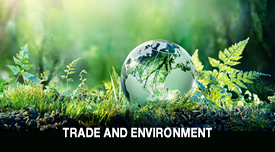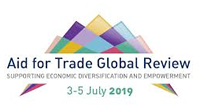04 July 2019
12:00 - 13:00 hrs. 10–11 a.m., WTO Headquarters, Room E
Geneva
, Switzerland

This green market provides an opportunity for biodiversity-rich developing countries to achieve export growth and improve conditions for sustainable development at the same time. But challenges associated with entering the green market can be prohibitive to small producers and MSMEs. How can Aid for Trade help them make the best out of green market opportunities? This was the focus of the discussion on Challenges of the Green Market, organised by UNCTAD in partnership with the Permanent Mission of Ecuador, the European Commission (DEVCO) and Fair Trade Advocacy Office at the occasion of Aid for Trade Global Review 2019. The debate was moderated by Isabelle Durant, Deputy Secretary-General of UNCTAD. The panellists represented different stakeholders in this debate: producing countries, civil society organizations and development partners.
- Diego Aulestia, Ambassador, Permanent Mission of Ecuador to the WTO
- Eric Beantanana, Economic and Trade Counsellor, Permanent Mission of Madagascar to the United Nations Geneva
- Sergi Corbalán, Executive Director, Fair Trade Advocacy Office
- Isabelle Durant, Deputy Secretary-General of UNCTAD (moderator)
- Bertrand Jolas, Policy Officer, Trade and Private Sector, Directorate General for International Cooperation and Development, European Commission
- Christian Robin, Deputy Head of Trade Promotion, Swiss State Secretariat for Economic Affairs
The green market is hard to enter
With very few exceptions, small producers and MSMEs cannot afford the costs of certification of voluntary sustainability standards (VSS), a proof that goods are produced sustainably. These requirements are value-chain specific, come in addition to SPS or TBT requirements, and can be expensive to meet.
“In fact, today’s green market is very much monopolised by large-scale farms and multinational corporations, while small producers only sell to lower-priced bulk commodity markets”, said Isabelle Durant, Deputy Secretary-General of UNCTAD, who moderated the session. She asked the speakers from Ecuador and Madagascar, both extremely rich in biodiversity, how they could make the most out of green market opportunities.
For Ecuador, Ambassador Diego Aulestia of the Permanent Mission of Ecuador to WTO confirmed that the BioTrade Initiative of UNCTAD since 2001 has contributed to the country’s public policy that helps people receive equitable benefits from natural ingredients for pharmaceutical and beauty products without destroying the natural environment. “But this requires investment and local producers have limited access to financial services. Aid for Trade can alleviate investment needs”, he said.
Eric Beantanana of the Permanent Mission of Madagascar to the UN Geneva said that “People in Madagascar do not know yet that biodiversity can be a strategic resource. Meeting organic, Fairtrade and other sustainability standards for them is a stumbling block rather than a tool to enter the green market. We need market information, knowledge and quality infrastructure. Aid for Trade to alleviate these challenges can help Madagascar improve production and services in various sectors and move to higher value addition.”
Sergi Corbalán of the Fair Trade Advocacy Office stressed that the green market should not be about consumers and big businesses dictating standards and imposing them upon producers. “It should be about value chains that are more equitable, where small producers and workers can bargain and receive better and fairer terms-of-trade. We are happy to partner with UNCTAD through its projects to transform value chains to become greener in a true sense for small producers, workers and MSMEs”, he said.
Aid for Trade can help
Aid for trade can assist small produces to achieve VSS certification, but this tends to be outside the radar of Aid for Trade activities. Key donors are looking into increasing their support to build the capacity of small producers and MSMEs to enter the green market.
Since 2003, the Swiss State Secretariat for Economic Affairs SECO has partnered with UNCTAD on BioTrade to enhance the linkages between sustainable trade and biodiversity. The BioTrade market is growing and currently valued at Euro 4.3 billion. “To enhance this trend, Aid for Trade can help make the regulatory framework for production and trade, both in producing and importing countries, more conducive to BioTrade.”, said Christian Robin of SECO.
“To scale up sustainable production and trade, the European Commission mobilizes different policy instruments to facilitate entry to the EU market for developing country producers”, asserted Bertrand Jolas of the European Commission (DEVCO). Such policy instruments range from preferential market access to support to productive capacity building, including investment support to MSMEs and sustainable agriculture.
The discussion reasserted the need for UNCTAD to continue working with developing countries through National Green Export Reviews, Fostering Green Exports through VSS project, and the BioTrade Initiative in close partnership with the Aid for Trade donor community.
There is some issue in accessing document path, Please contact to Site Admin
There is some issue in accessing document path, Please contact to Site Admin
Co-organizer(s):
Mission of Ecuador, European Commission (DEVCO), and the Fair Trade Advocacy Office (FTAO)
Language(s)
English |
Related Site:
Trade and Environment, Climate Change and Sustainable Development Branch

WTO Aid for Trade Global Review 2019: Supporting Economic Diversification and Empowerment
www.wto.org 
Fostering Green exports through Voluntary Sustainability Standards
https://unctad.org/en/Pages/DITC/Trade-Analysis/TAB-Project-1617AI.aspx
https://unctad.org/en/Pages/DITC/Trade-Analysis/TAB-Project-1617AI.aspx
UN Forum on Sustainability Standards (UNFSS)
https://unfss.org/
https://unfss.org/
Fair Trade Advocacy Office interview with Isabelle Durant



